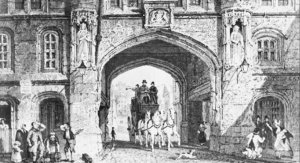 | |
|
Heading north on the A46 from Newark it is almost impossible to believe there once was a public house a short distance south of the roundabout at Halfway Houses.
The pub began life at Halfway House Farm. In 1856 the pub moved south to its final location. It and the nearby Red Lion were well placed to serve and accommodate the weary traveller being almost exactly midway between Newark and Lincoln.
During the Lincoln Handicap it was usually granted an alcohol licence extension so the late night travelling punters could celebrate their wins and losers could get some consolation in an alcoholic drink.
Auctions and inquests were also held at the pub.
Its end came with the building of RAF Swinderby, one of the last stations completed under the RAF's expansion plans begun in the 1930s. The pub was demolished in 1940 to make was for a dispersal point. As a result, the tenants moved to the newly constructed Fosse Way public house on the A46 near Thorpe on the Hill, where they remained until their retirement in 1956.
 |
| 1912 Ordnance Survey Map overlaid with Bing aerial view © National Library of Scotland |
 |
| Google Streetview of the location of the Sir Isaac Newton public house. Too dangerous to stop to take a photo. |
List of Licensees of the Sir Isaac Newton public House
1855 Richard Glazier
1860,1861 William Bottomley
May 1870 Robert Merry becomes licensee
1872 Robert Croft
Dec 1874 W Smith becomes licensee
1896 George Makin, 1st March 1893 he was prosecuted for selling adulterated brandy.
1905 William Henry White
1909/1913 Richard Bones
1919 Mary Ann Bones
27 February 1920 the S.I.N sold by auction for £1,550. With 10 acres of Land to Mr Antill of Cleethorpe. Was he acting as agent for James Hole?
1924 licencee W D Antill
Mar 1934 Application for extension for Lincoln Handicap, licencee A J Gardner
Arthur Gardner was licensee of the Sir Isaac Newton and became licensee of The Fosse Way from 1940, he retired in 1956 after 43 years with James Hole's brewery.



